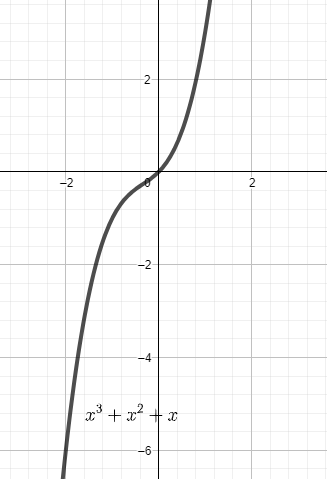Question
Question: How do you find the critical numbers for \(f\left( x \right)={{x}^{3}}+{{x}^{2}}+x\) to determine th...
How do you find the critical numbers for f(x)=x3+x2+x to determine the maximum and the minimum?
Solution
We find the slope of the given function f(x)=x3+x2+x. We equate it with 0. Extremum points in a curve have slope value 0. We solve the quadratic solution to find the coordinates and the points.
Complete step by step answer:
We need to find the relative extrema of the function f(x)=x3+x2+x.
To find the extremum points we need to find the slope of the function and also the value of the point where the slope will be 0.
Extremum points in a curve have slope value 0.
The slope of the function f(x)=x3+x2+x can be found from the derivative of the function f′(x)=dxd[f(x)].
We differentiate both sides of the function f(x)=x3+x2+x with respect to x.
f(x)=x3+x2+x⇒f′(x)=dxd[f(x)]=dxd[x3+x2+x].
We know that the differentiation form for nth power of x is dxd[xn]=nxn−1.
Therefore, f′(x)=dxd(x3)+dxd(x2)+dxd(x)=3x2+2x+1.
To find the x coordinates of the extremum points we take 3x2+2x+1=0.
We know for a general equation of quadratic ax2+bx+c=0, the value of the roots of x will be x=2a−b±b2−4ac.
In the given equation we have 3x2+2x+1=0. The values of a,b,c is 3,2,1 respectively.
We put the values and get x as x=2×3−2±22−4×1×3=6−2±−8=3−1±i2.
The roots of the slope are imaginary which means the curve f(x)=x3+x2+x has no extremum values.
f′(x)=3x2+2x+1 is equation with value being greater than 0 as 3x2+2x+1=2x2+(x+1)2 is sum of squares. So, f′(x)=3x2+2x+1>0.
In no points of the curve f(x)=x3+x2+x has slope value 0.
Note: We can also prove it from the graph of the curve f(x)=x3+x2+x. This is an increasing function. There is no sharp curve in the graph to have slope 0.

